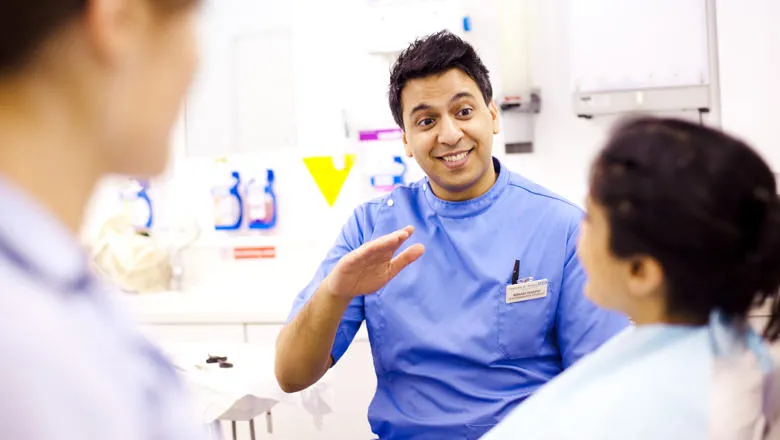With impending NHS dental system reform just published and the oral healthcare service delivery issues highlighted by the Covid-19 pandemic, there is a clear need for emphasis to be placed on a personalised prevention based approach to minimum intervention oral healthcare delivery by all members of the primary care oral healthcare team, to maintain life-long oral health in individuals and populations, in the UK and globally.
Professor Avijit Banerjee
05 December 2022
Minimum intervention oral care developments explored in panel event
Professor Avijit Banerjee and an expert panel discussed the benefits of learning and practising minimum intervention oral healthcare, as well as the opportunities that stem from it

Earlier this year, the Faculty of Dentistry, Oral & Craniofacial Sciences hosted a keynote panel event on developments in minimum intervention oral care (MIOC) delivery. The event focused on the renewed emphasis on MIOC and its related career pathways for all primary care team members.
MIOC is a personalised approach to oral care and takes care to manage patients' needs, desires and expectations. A combination of team delivery and patient-focused care help maintain long-term oral health with preventive, behaviour-related care plans.
Chairing the session was Avijit Banerjee, Professor of Cariology & Operative Dentistry in the Centre for Oral, Clinical & Translational Sciences. Expert guests taking part on the panel included Dr Abhi Pal, President of the College of General Dentistry; Dr Sara Hurley, Chief Dental Officer for England; Ms Amanda Gallie, past president of the British Association of Dental Therapists; and Dr Len D’Cruz, Head of Indemnity at the British Dental Association.
Over the course of the event, the panel discussed some of the issues surrounding MIOC.
Dr Abhi Pal discussed the career pathways framework for the primary oral care team, including the College of General Dentistry’s certified membership scheme framework, to enable a structured career progression pathway for primary care practitioners and team members.
Ms Amanda Gallie talked about the importance of implementation of MI oral healthcare for the primary care oral health team, and her experience of studying and graduating from the Advanced Minimum Intervention Restorative Dentistry (AMIRD) MSc at King’s.
The importance of prevention-based oral care delivery through phased courses of treatment was emphasised by Dr Sara Hurley. She explored how the MIOC philosophy and minimally invasive dentistry underpin the values of NHS oral care delivery now and into the future of dental system reform.
Dr Len D’Cruz talked about the lessons learnt from the blended contracts that ran in primary care dental practices during the past decade. This has helped to inform NHS dental system reform, with an improved focus on prevention-based care.
Exploring these issues, potential pragmatic solutions were debated by the experts on the panel, outlining the necessary clinical and contracting policy developments for prevention-based phased care and its wider implications in society, as well as the revolutionary opportunities for experience based primary care team career progression from the College of General Dentistry.
This discussion highlighted the benefits of postgraduate training, including the blended learning AMIRD MSc at King’s, which is designed for dentists and dental therapists working in primary care, and can be linked to the CGDent career pathways framework and their competency domains.

